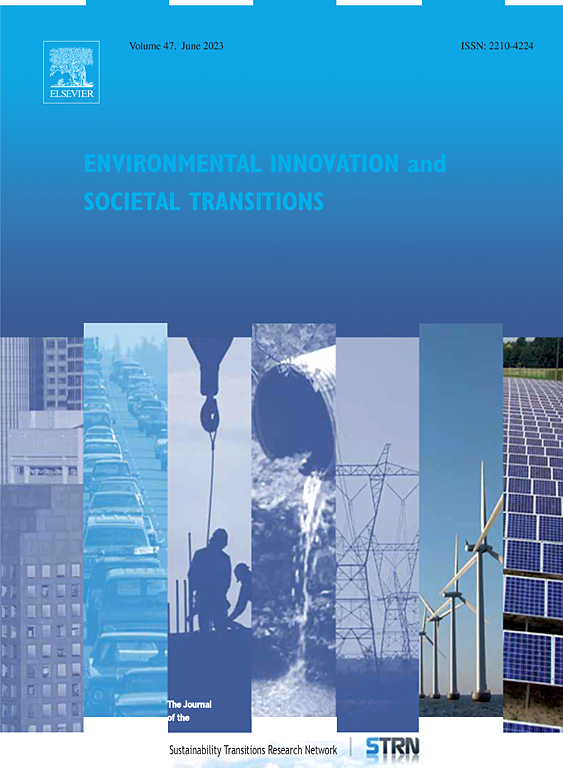Harnessing social innovation for a just transition: A case study of tea industrialization in China's era of ecological civilization
IF 5.7
2区 经济学
Q1 ENVIRONMENTAL SCIENCES
Environmental Innovation and Societal Transitions
Pub Date : 2024-09-28
DOI:10.1016/j.eist.2024.100917
引用次数: 0
Abstract
The narrative of 'just transition' has gained significant traction in arenas of transition research and policymaking. Social innovation can play a central role in delivering a just transition, fostering social change and providing social arrangements that enable adjustment to change. Engaging with the ‘shapeshifting’ nature of social innovation, this research conceptualizes social innovation at the core of the just transition. Through an in-depth empirical case of tea industrialization in Enshi, China, this research explores how a locally born social innovation, Enshi Yulu, has gained momentum in advancing a just transition in-the-making in a new era of ecological civilization. The empirical analysis reveals that the key to the empowerment of Enshi Yulu in driving a just transition in Enshi city lies in the introduction of updated forms of the social innovation at opportune moments. This finding underscores the importance of comprehending the context- and time-sensitive nature of social innovation in navigating the directionality of transition towards more just outcomes. The core analytical question lies not in characterizing the ultimate shape of social innovation, but in understanding how certain initiatives come to be understood as social innovation and with what implications.
利用社会创新实现公正转型:中国生态文明时代的茶叶产业化案例研究
公正过渡 "的说法在过渡研究和决策领域获得了极大的支持。社会创新可以在实现公正过渡、促进社会变革和提供社会安排以适应变革方面发挥核心作用。本研究结合社会创新的 "变形 "特性,将社会创新概念化为公正转型的核心。本研究通过对中国恩施州茶叶产业化的深入实证案例,探讨了恩施玉露这一在当地诞生的社会创新,如何在生态文明新时代的公正转型中获得发展动力。实证分析表明,恩施雨露之所以能推动恩施市的公正转型,关键在于适时引入社会创新的更新形式。这一发现强调了理解社会创新的背景和时间敏感性在引导向更公正结果过渡的方向性中的重要性。核心分析问题不在于描述社会创新的最终形态,而在于理解某些举措如何被理解为社会创新,以及会产生什么影响。
本文章由计算机程序翻译,如有差异,请以英文原文为准。
求助全文
约1分钟内获得全文
求助全文
来源期刊

Environmental Innovation and Societal Transitions
Energy-Renewable Energy, Sustainability and the Environment
CiteScore
13.60
自引率
19.40%
发文量
90
审稿时长
56 days
期刊介绍:
Environmental Innovation and Societal Transitions serves as a platform for reporting studies on innovations and socio-economic transitions aimed at fostering an environmentally sustainable economy, thereby addressing structural resource scarcity and environmental challenges, particularly those associated with fossil energy use and climate change. The journal focuses on various forms of innovation, including technological, organizational, economic, institutional, and political, as well as economy-wide and sectoral changes in areas such as energy, transport, agriculture, and water management. It endeavors to tackle complex questions concerning social, economic, behavioral-psychological, and political barriers and opportunities, along with their intricate interactions. With a multidisciplinary approach and methodological openness, the journal welcomes contributions from a wide array of disciplines within the social, environmental, and innovation sciences.
 求助内容:
求助内容: 应助结果提醒方式:
应助结果提醒方式:


